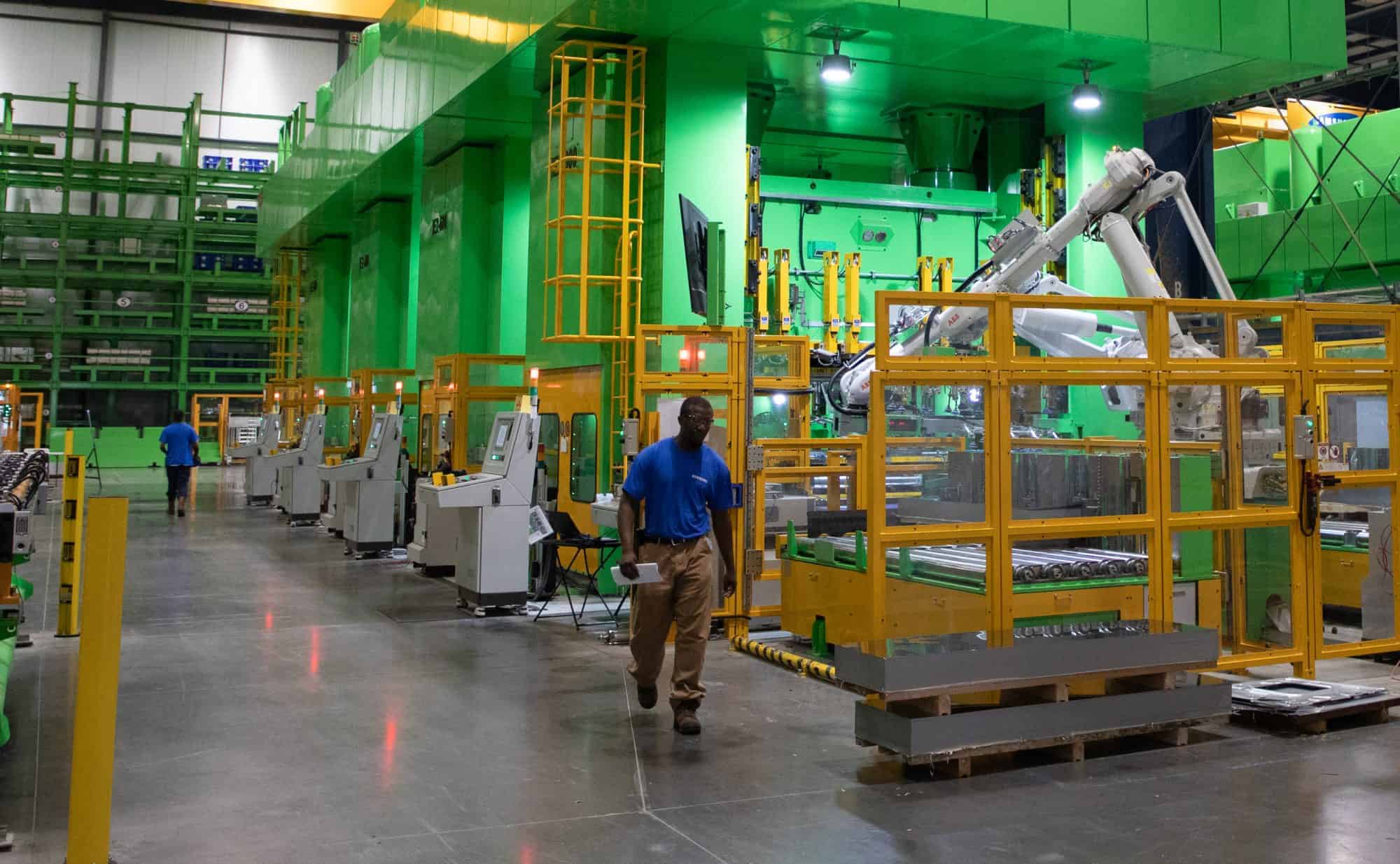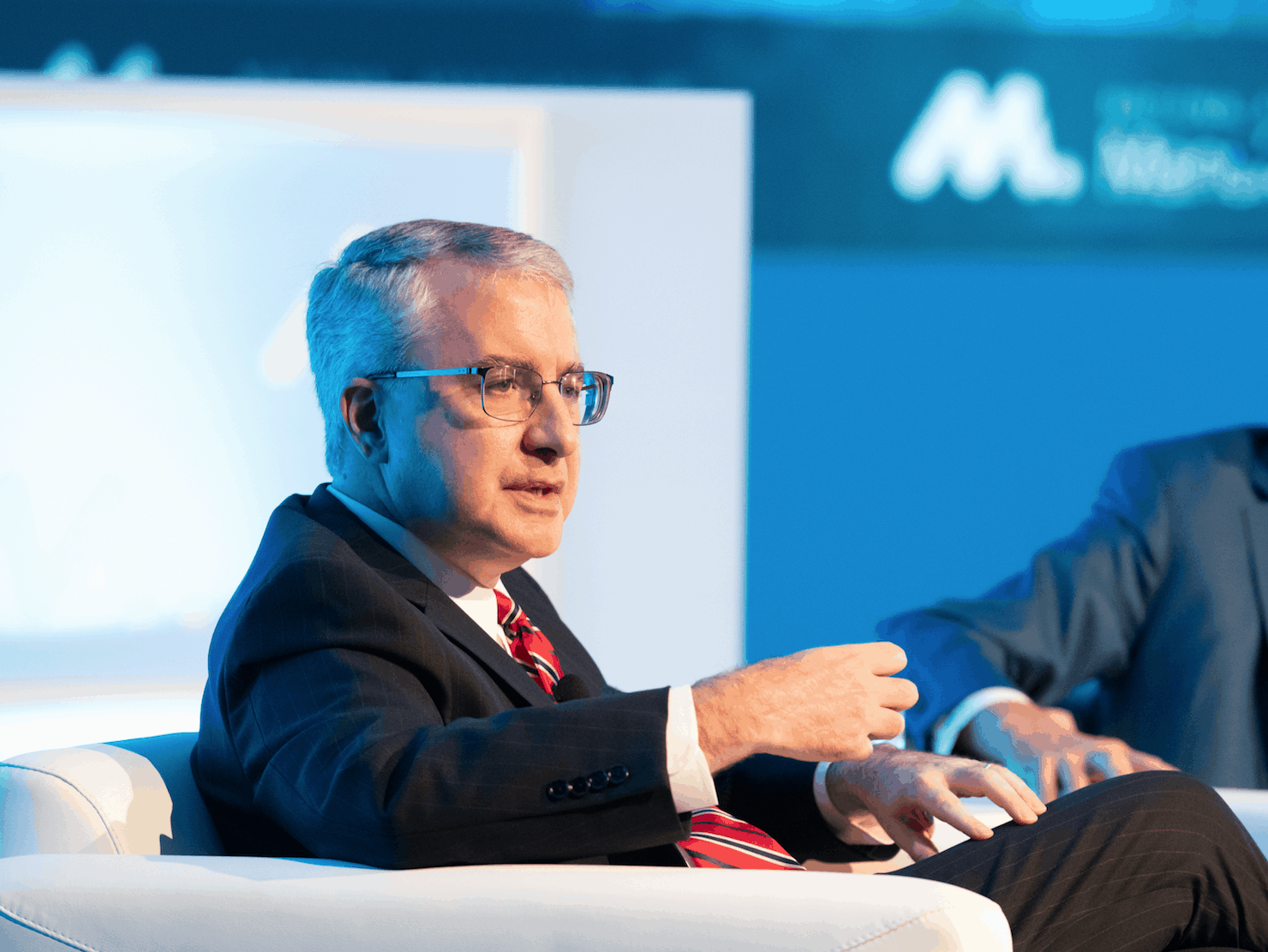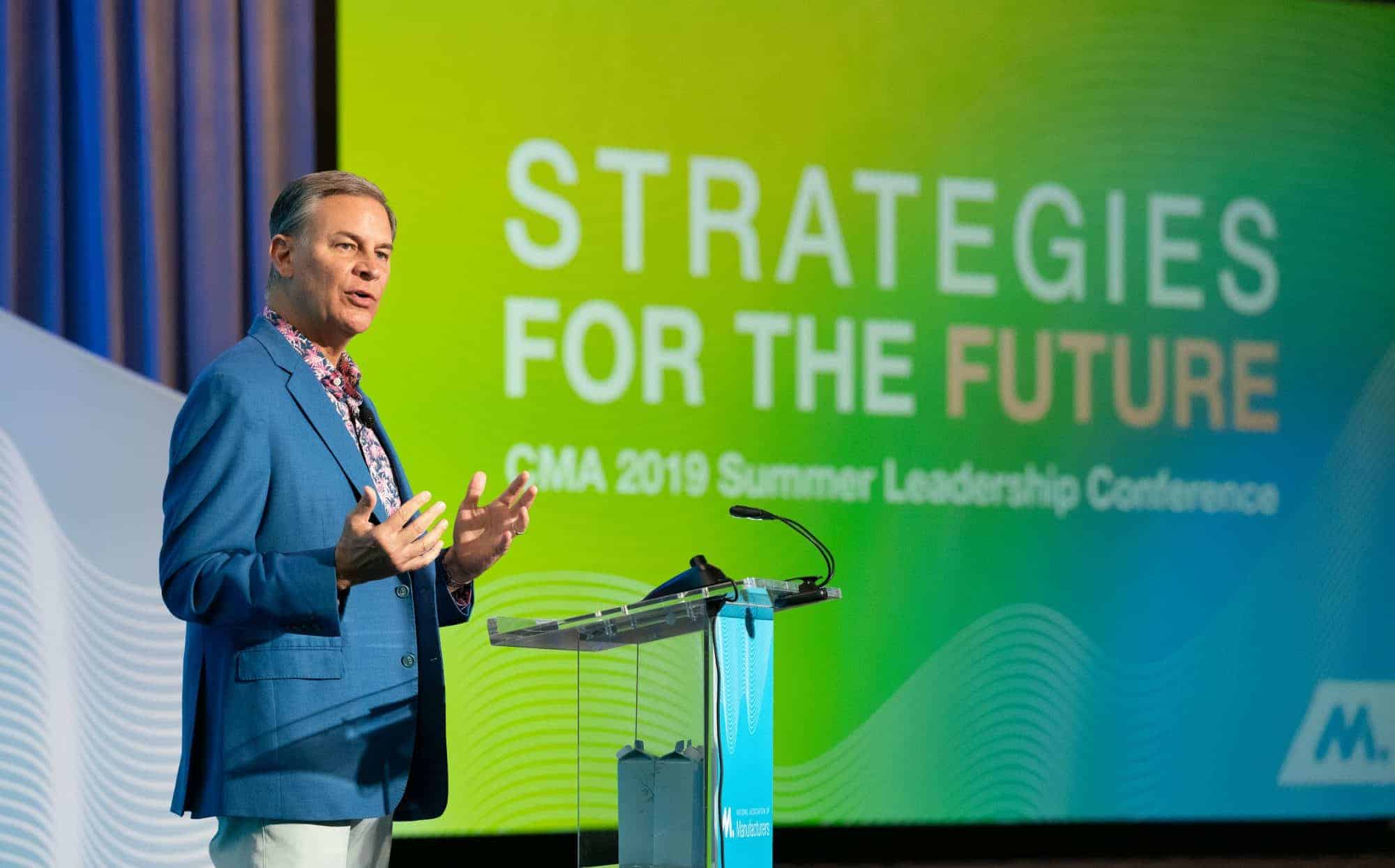Manufacturers Prepare for Iowa Caucuses

Today, the Iowa caucuses will kick off the Democratic presidential primary, beginning the months-long process to decide which candidate will represent the party in November. As is so often the case, the men and women who make things in America are in a position to have their voices heard and play a leading role in determining the outcome—in Iowa and across the country.
Manufacturers account for almost 19% of Iowa’s total economic output, and the 233,000 manufacturing jobs in Iowa make up about 14% of the state’s workforce. Between those manufacturing workers and the tens of thousands more jobs and households supported by manufacturers’ indirect impact on Iowa’s economy, manufacturing voters are poised to play an important role in shaping Iowa’s election-night decision—and manufacturers are positioned to lead on solutions with voters and candidates alike.
“Support for pro-growth policies should span the political spectrum, and for the most part it does,” said Doug Neumann, executive director of the Cedar Rapids Metro Economic Alliance. “During his NAM State of Manufacturing Address, Jay’s message on ‘post-partisanship’ really resonated with the Iowa business community. In my community, we try to lead this way with our elected officials and work with whoever is elected to get things done.”
According to Nicole Crain, executive vice president of the Iowa Association of Business and Industry, the business community in Iowa wants a candidate who supports manufacturing issues and understands their challenges.
“Business leaders like certainty and the ability to plan investments in their business five, ten years into the future,” said Crain. “As the election gets closer, leaders will be looking for a candidate who understands business, is open to hearing the concerns of employers and considers their positions when proposing policies for the country.”
Trade, immigration and workforce are top of mind for manufacturers.
“Iowa manufacturing voters have a crucial role to play during the caucuses and throughout the 2020 election season,” said Michael O’Brien, NAM assistant vice president of advocacy. “That’s why the NAM will work diligently throughout the year to make sure that manufacturing voters understand the issues and the stakes for manufacturing come Election Day.”
Timmons Delivers 2020 NAM State of Manufacturing Address in Iowa
Speech Marked 125th Anniversary of NAM’s Founding and Highlighted ‘Creators Wanted’ Campaign to Address Growing Workforce Shortage
Washington, D.C. – National Association of Manufacturers President and CEO Jay Timmons delivered the eighth-annual NAM State of Manufacturing Address today at equipment manufacturer Vermeer Corporation in Pella, Iowa. Speaking to Vermeer Corporation employees, business and community leaders and local manufacturers, Timmons highlighted the NAM’s ambitious plan to address the industry’s growing workforce crisis with the groundbreaking, multimillion-dollar “Creators Wanted” campaign.
In his remarks, Timmons said:
“For 125 years, your NAM has led the business community and fought for all who make things in America. And all of you in this room, and the 13 million men and women in our industry, some of whom are watching today, are part of the storied history of building an exceptional nation. And Vermeer, this very company, embodies the story of manufacturers’ progress.”
. . . .
“In this pivotal year, the NAM and The Manufacturing Institute, our workforce and education partner, are setting out on an unprecedented campaign to inspire a new generation—and tell the real story of our industry. . . . Our historic effort, called “Creators Wanted,” is a capital campaign that will support the programs of the Manufacturing Institute—including the STEP Women’s Initiative, youth engagement and Heroes MAKE America, which trains our returning servicemembers for high-paying manufacturing jobs.”
. . . .
“Just yesterday, in his remarks at the World Economic Forum, President Trump touted manufacturing’s growth and success during his presidency. As I’ve said before, from tax reform to regulatory certainty to leveling the playing field, promises made to manufacturers have been promises kept—and the employment and output numbers show it.”
. . . .
“Here’s what I will say about this election . . . It’s not the label next to a candidate’s name—whether an “R,” a “D” or an “I”—that determines whether he or she will be a good president or even a good member of Congress. The test is whether he or she will work to uphold the values that make America exceptional. These are the same four values, the same four pillars, that make our industry’s success possible.”
Timmons also noted the generous contributions made by Vermeer and Pella Corporation to the NAM’s Creators Wanted campaign.
“And I am proud to announce today that Vermeer Corporation, along with your foundation and Mary and Dr. Dale Andringa, have contributed $100,000 to this cause. And another local manufacturer, Pella Corporation, is also leading by example with a $100,000 contribution of their own,” said Timmons.
Vermeer Corporation President and CEO Jason Andringa thanked Timmons for his visit and the NAM’s commitment to ensuring the long-term success of manufacturing in the United States.
“Thank you to Jay Timmons and the National Association of Manufacturers for visiting Vermeer Corporation and recognizing the incredible work of our team members and manufacturers across the country,” said Andringa. “These men and women truly demonstrate the impact our industry makes every day and represent the success of American manufacturing.”
To read the full address, click here.
-NAM-
The National Association of Manufacturers is the largest manufacturing association in the United States, representing small and large manufacturers in every industrial sector and in all 50 states. Manufacturing employs more than 12.8 million men and women, contributes $2.37 trillion to the U.S. economy annually and has the largest economic multiplier of any major sector and accounts for 63% of private-sector research and development. The NAM is the powerful voice of the manufacturing community and the leading advocate for a policy agenda that helps manufacturers compete in the global economy and create jobs across the United States. For more information about the Manufacturers or to follow us on Twitter and Facebook, please visit www.nam.org.
Manufacturers Carry Policy Win Momentum Into 2020

Aric Newhouse is the senior vice president of policy and government relations at the National Association of Manufacturers. Here he breaks down manufacturers’ biggest policy victories in 2019 and what is ahead for 2020.
Manufacturers saw many big achievements in the final weeks of 2019. What is the impact of these and was it a surprise?
The Democratic-led House of Representatives approved the U.S.-Mexico-Canada Agreement with a strong bipartisan vote of 385-41. The trade agreement still needs to be approved by the Republican-led Senate. This was a major accomplishment, especially considering that about two years ago many thought that the U.S. was on the verge of withdrawing from NAFTA and the entire North American trading relationship, which support 2 million manufacturing jobs, was at risk of crumbling.
On top of the USMCA, the Trump administration reached a “phase one” trade deal with China. This is another achievement many thought would be impossible. But now we have real, enforceable intellectual property protections in place in China and a foundation for a “phase two” deal.
Right before Congress left for the holidays, they passed a year-end government funding bill, which included a seven-year reauthorization of the Export-Import Bank and the repeal of the medical device tax, “Cadillac” tax and health insurance tax. Some of those taxes were poised to hit hard in 2020, so this comes as a big relief for manufacturers.
And was all this a surprise? I am sure it surprised many people that all of this got done in the middle of a contentious political moment. However, the NAM has spent a long time, in some cases years, laying the groundwork to make these wins possible, so we had some confidence that the agenda of manufacturers and their workers would win the day.
There was a time when USMCA passage was in doubt. How did you win over lawmakers?
The NAM, in close coordination with our members and with their incredible support and work, made clear to policymakers that the USMCA was not about politics but was about our growth, our exports and our people. Successfully doing so turned the discussion around the deal from skepticism to support and was critical to its passage. Granted, we did not get everything we wanted, but we achieved our number one goal: protecting our biggest trading relationship with a modernized trade agreement.
What is ahead for 2020?
Number one, we will get the USMCA passed in the Senate. We will provide support for a “phase two” trade deal with China that further levels the playing field, provides enforceable rules and secures relief from costly tariffs. And we will continue our advocacy on manufacturers’ other top priorities, including infrastructure investment, immigration and health care reform. We want to see more regulatory certainty from the federal agencies so that manufacturers can continue investing confidently in the future.
Impending Health Care Taxes Loom Over Manufacturers

Manufacturers are committed to offering the highest quality healthcare to employees. But the cost of health insurance continues to rise, and three previously-delayed health care taxes are set to go into effect unless Congress acts. Catie Kawchak, National Association of Manufacturers Director of Infrastructure, Innovation and Human Resources, discusses the continued urgent fight against higher costs.
What are the taxes manufacturers are fighting against?
Manufacturers are fighting against three major taxes on health care: the Health Insurance Tax (HIT), a multi-billion dollar tax imposed on health insurance premiums; the so-called Cadillac Tax, a 40 percent tax on more expensive health insurance plans; and the medical device tax, a tax on life-saving medical devices.
Why do these taxes matter for manufacturers?
All three would increase the cost of care and undermine employees’ wellbeing. According to Oliver Wyman global consulting, HIT could raise the cost of premiums by an additional $500 for the families of small business owners and their employees. The Cadillac Tax places a 40 percent tax on “high-cost” health insurance plans, making it difficult to provide high-quality insurance to employees. The medical device tax would cost manufacturers $2 billion annually, diverting resources from investment in life-saving equipment and making it harder for these businesses to expand.
What is the overall impact on manufacturers?
Manufacturers provide great benefits to their workers not only to attract or retain employees but because it’s the right thing to do. Tax proposals like these make it more difficult to provide the care that our employees depend on and to invest in life-saving medical innovations. Manufacturers employ about 13 million people across the country, and these taxes would harm them and their communities.
Why does this matter now?
Congress must move quickly to prevent these taxes from impacting manufacturers. HIT and the medical device tax are both set to go into effect on January 1, 2020, meaning Congress only has a few weeks to stop or delay these penalties. And even though the Cadillac Tax doesn’t go into effect until 2022, manufacturers have already begun to prepare for a 40 percent tax hike on high-cost health benefits. The only way to prevent these tax hikes from harming manufacturers is for Congress to repeal or delay them in the coming weeks. That’s why the NAM has been working so hard on this issue.
What’s next?
Manufacturers are united with bipartisan lawmakers to stop these harmful taxes. In November, bipartisan freshman congressmen urged their colleagues to address the HIT this year; with the NAM’s strong support, the House already passed Middle Class Health Benefits Tax Repeal Act of 2019 by a vote of 419-6 to repeal the Cadillac Tax; and legislation to repeal the medical device tax has the support of a majority of the House. On Wednesday, the NAM united with fellow advocacy leaders at the Business Roundtable and U.S. Chamber of Commerce to call for repeal of all three taxes this year. Congress should end them now.
NAM Launches Campaign to Support Lifesaving Innovations
Manufacturers Turn Up Heat in Key States with Seven-Figure Buy
Washington, D.C. – The National Association of Manufacturers has launched a seven-figure advertising campaign urging lawmakers to support the manufacturers that develop lifesaving innovations by opposing drug-pricing control proposals that act as a hidden tax on the industry. The campaign also thanks senators who have stood up for manufacturers. This nationwide digital, print and cable campaign follows an initial effort launched in mid-September that featured advertisement in several nationwide outlets, including The Wall Street Journal, Axios, The Washington Post, The Hill and Politico.
We need a better approach to drug pricing that supports the manufacturers developing lifesaving and life-changing cures for people in this country and around the world, said NAM President and CEO Jay Timmons. The proposals being debated in Congress right now would put our health at risk, abandon free market principles and move us closer to a top-down, government-controlled health care system. Our top priorities should be ensuring safety and quality, while upholding the values that make our country exceptional and economy strong: free enterprise, competitiveness, individual liberty and equal opportunity.
As the employers of nearly 13 million Americans, manufacturers care deeply about lowering the cost of health care, and as the innovators behind many revolutionary medicines, manufacturers are also committed to delivering lifesaving and life-changing cures to people in this country and around the world. When misguided government proposals threaten our ability to deliver health care and drive innovation, we are compelled to speak out.
More information can be found at www.nam.org/hiddentax.
-NAM-
The National Association of Manufacturers is the largest manufacturing association in the United States, representing small and large manufacturers in every industrial sector and in all 50 states. Manufacturing employs more than 12.8 million men and women, contributes $2.38 trillion to the U.S. economy annually, has the largest economic multiplier of any major sector and accounts for more than three-quarters of private-sector research and development. The NAM is the powerful voice of the manufacturing community and the leading advocate for a policy agenda that helps manufacturers compete in the global economy and create jobs across the United States. For more information about the Manufacturers or to follow us on Shopfloor, Twitter and Facebook, please visit www.nam.org.
Drug Price Controls Threaten Innovation and Patient Health

The United States has a long history of medical and pharmaceutical innovation and leads the world in the development of new treatments and cures. Yet, some policymakers have suggested imposing top-down regulations such as unproven drug importation and index pricing to reduce drug prices. Those actions would put this innovation at risk. The gains were are making today in COVID treatments and vaccines now shine a spotlight on the importance of a market-oriented health care ecosystem that can respond to new and emerging health threats in real-time.
National Association of Manufacturers Vice President of Infrastructure, Innovation and Human Resources Policy Robyn Boerstling explains drug price controls and how they could impact everyday Americans.
What’s the problem with price controls?
Everyone agrees with the goal of reducing the costs of health care—and prescriptions in particular. The question is how to get there. One way we know will not work is via government-imposed price controls or other arbitrary measures. Non-market-based approaches like this are antithetical to the free enterprise system that forms the bedrock of our economy and way of life. Once we allow the government to run negotiations on our medicines, the government will have an even stronger incentive to run our health care—and that is exactly what many who support price controls like this would like to see.
Why is this important now?
We are in a period of tremendous breakthroughs and medical discovery, led by pharmaceutical manufacturers in partnership with the National Institutes of Health, universities and other private groups. Pharmaceutical manufacturers spend more on research and development than any other industry, creating new treatments and cures that have the potential to save and improve millions of lives. In addition to funding R&D up front, pharmaceutical manufacturers also put a sizeable share of their revenue back into R&D so that today’s treatments can help fund tomorrow’s cures. Imposing arbitrary price controls will threaten those investments and undermine a system that is working to save millions of vulnerable people.
How should the new Congress and Administration approach high drug prices?
There’s no doubt that health care costs have been rising too quickly for far too long for American families. Those costs have contributed to wage stagnation for workers and discouraged other investments in the workplace. But we need to address inefficiency, affordability, improved outcomes and flexibility to drive down health care costs without abandoning market-based approaches. Any solutions should be guided by the four pillars that have made America exceptional: free enterprise, competitiveness, individual liberty and equal opportunity.
That will require a comprehensive approach to the various forces that strain the system, recognizing the importance of innovation as a tool to reduce costs and improve health outcomes. Congress and the White House should support patient access to lifesaving medicines—and the American manufacturers and researchers that deliver them—instead of upending American health care in favor of an uncertain future.
Importing Prescription Drugs from Canada is a Serious Safety Risk

The Trump administration wants to allow Americans to import drugs from Canada as part of the President’s larger goal to lower prescription drug prices.
Robyn Boerstling, Vice President of Infrastructure, Innovation and Human Resources at the National Association of Manufacturers, explains the proposal and how drug importation affects manufacturers.
Why is drug importation coming up now?
This has been one of President Trump’s priorities since the 2016 campaign. More broadly, lowering prescription drug prices has been a top priority for manufacturers and policymakers for some time now, as health care costs continue to rise.
However, manufacturers in the U.S. think importing drugs from Canada poses a serious health risk, especially considering the counterfeit challenges we already face.
How does drug importation fit into the larger conversation on health care?
The NAM insists something must be done to address high health care costs. But it shouldn’t just be about the transaction at pharmacy counter. Any solution has to be holistic, addressing the systematic challenges without sacrificing competitiveness and free enterprise in the process.
How does drug importation affect manufacturers?
The biopharmaceutical industry has experienced tremendous growth recently, supporting 1,100 manufacturing plants across the U.S. and Puerto Rico and employing thousands of high-skilled employees. In fact, the biopharmaceutical industry was the top manufacturing sector for job postings in 2018, according to Burning Glass Technologies’ Labor Insights.
These companies are at the cutting edge of creating the cures of tomorrow, and America’s policies on drug prices should take into consideration both the desire to lower prescription drug prices and the opportunities and benefits provided by this sector. Moreover, other countries don’t guarantee the same standards as drugs made in the U.S—and we should not be looking outside our carefully managed supply chain as a source of our medicines.
Why is drug importation a threat for consumers?
Counterfeit and substandard drugs are a growing problem worldwide. The challenge is most acute in the developing world, impacting about 10 percent of the drug supply according to the World Health Organization. Fortunately, the U.S. has the safest drug distribution system in the world, but importing drugs from Canadian pharmacies would be a direct challenge to that proven model.
Would drug importation work in the United States?
If this plan led by the Trump administration is truly a way to lower costs, we have to ask: Are the savings guaranteed for the patient? The infrastructure that will be necessary to assure safety will be costly. It’s difficult to ignore the question, “Will importation actually reduce prescription drug expenditures?”
It’s worth noting, in 2004 when the Congressional Budget Office looked at this issue, significant long-term savings on prescription drug spending did not materialize, especially in a Canada-only importation scenario.
There is something broken when people have access to but cannot afford the drugs they need. If the United States can build the safest medical supply in the world, we can find ways to be more affordable to the people who need relief the most.
In Today’s Political Climate, Business Community Must Lead

At the Council of Manufacturing Associations summer conference last week, National Association of Manufacturers President and CEO Jay Timmons called on the business community to lead in today’s political climate.
At @namcma‘s summer conference, I had the pleasure of speaking with top business advocacy leaders. Our country feels more divided than united. Manufacturers have to be advocates for individual liberty and equal opportunity.
— Jay Timmons (@JayTimmonsNAM) August 12, 2019
Timmons urged business leaders to show Americans the good that their companies are doing in communities, rejecting discrimination and bigotry and doubling down on free enterprise and individual liberties.
The solution is not to go on the attack or get defensive, nor is it siding with one party over the other. There’s dangerous thinking on both sides of the aisle. We have to show Americans the good our companies do every day. We’re changing and saving lives.
— Jay Timmons (@JayTimmonsNAM) August 12, 2019
If we aren’t advocates for individual liberty and equal opportunity, Americans will be drawn to those voices that don’t share our values of free enterprise and competitiveness. We have to take the lead.
— Jay Timmons (@JayTimmonsNAM) August 12, 2019
STEP Award Winner Leads Teams, Saves Lives

As the North America Deliver Operations Lead at Johnson & Johnson, Elaine Thibodeau’s work helps ensure quality, continuity, preparedness and resiliency across the supply chain. She also serves as an advocate for women in the manufacturing industry and a voice of encouragement for millions of young women and girls who might enter the industry one day.
“I think we need to keep fighting the myth that a manufacturing career doesn’t marry well with having a family,” Thibodeau said. “We need to find opportunities to bring young women into our factories and give them early, positive experiences with the industry.”
Her 30 years of experience at Johnson & Johnson includes time in orthopedics, diagnostics, pharmaceutical manufacturing and consumer medical devices – roles that have come with all sorts of challenges. Earlier in her career, Thibodeau led a team that was tasked with taking over a third-party plant to continue producing an oncology medication that was on the FDAs drug shortage list. By making a deal with a supplier to take over a section of their plant, she kept production running.
Doctors in an advocacy group told Thibodeau how essential the medication was for their patients and how shortages caused them to make difficult decisions. “That always stuck with me – it motivated me every day to do my job well,” she said.
At times, Thibodeau faced immense challenges. After Hurricane Maria devastated Puerto Rico, she worked to get manufacturing up and running, bringing jobs back to the community that was deeply affected and providing vital products to enable employees to take care of themselves.
“Day-to-day life was just physically difficult,” she said. “We had to take care of the people first, making sure they had what they needed to be safe, whether that was a generator or medicines or water or diapers.” In collaboration with site leaders and other businesses in the area, she helped to rebuild the industry and begin the process of renewal.
Thibodeau’s interest in manufacturing began at a young age. As a young girl, she built furniture for her dolls with raisin boxes and pieces of wood she found in her family’s garage. When her father, an electrician, went to work, she would tag along, learning how to trouble shoot, which is a skill that has proven valuable.
“I had building blocks and I liked to sew,” Elaine remembered. “I was always interested in putting things together.” An enthusiasm for math and some encouraging teachers led her to an engineering degree, and after a few years, she was offered her first role at Johnson & Johnson – beginning an exciting career that continues to draw her out of her comfort zone.
“If the new job or the new project doesn’t scare you a little bit,” she said, “you’re probably going to be bored in six months.”
Elaine Thibodeau won a 2019 Manufacturing Institute STEP Ahead Award. This profile was adapted from an original interview for the Input, the NAM’s members-only e-newsletter.
NAM Pushes Back on Onerous State Health Care Bills
Washington, D.C. – The National Association of Manufacturers has begun pushing back on a wave of onerous health care bills in state capitols across the country. Since December, the NAM has come out in opposition to legislation in Michigan, Minnesota, Oregon and Utah that seeks to lower the cost of prescription drugs but would erode manufacturers’ intellectual property protections, chill innovation or expose U.S. consumers to unsafe medicines.
There is no question that skyrocketing health care costs are disrupting families and businesses around the country, but these legislative proposals come with serious and untenable side effects for both manufacturers and patients in America, said NAM Vice President of Infrastructure, Innovation and Human Resources Policy Robyn Boerstling. These misguided bills could undermine intellectual property rights, chill innovation or threaten to expose patients to unsafe medicines. Manufacturers support efforts to increase access to affordable medicines, but these pieces of legislation are a classic example of how good intentions can lead to negative outcomes that fail to contain health care costs.
- In Michigan, the NAM came out in opposition to H.B. 5223 in December 2018, which threatens manufacturers’ intellectual property protections by requiring them in certain cases to submit a substantial amount of proprietary data, including costs associated with R&D, to the state Department of Health and Human Services, with no protections for the data submitted. Click here for more.
- In Minnesota, the NAM came out in opposition to House File 1246 in March 2019, which would threaten intellectual property protections by requiring manufacturers to disclose highly-sensitive proprietary information, creating unnecessarily burdensome requirements that are contrary to the free and competitive market that has allowed biopharmaceuticals to develop new life-saving treatments. Click here for more.
- In Oregon, the NAM came out in opposition to a legislative proposal in January 2019 that would authorize the state to apply for federal approval to import prescription drugs from Canada, which does not have the same standards or long-established mechanisms in place to protect patients as the U.S. Click here for more.
- In Utah, the NAM came out in opposition to H.B. 267 in March 2019, which would authorize the state to apply for federal approval to import prescription drugs from Canada. The bill could expose consumers to counterfeit and adulterated therapies because Canada does not make product safety guarantees to the U.S. Click here for more.
-NAM-
The National Association of Manufacturers (NAM) is the largest manufacturing association in the United States, representing small and large manufacturers in every industrial sector and in all 50 states. Manufacturing employs more than 12 million men and women, contributes $2.25 trillion to the U.S. economy annually, has the largest economic impact of any major sector and accounts for more than three-quarters of private-sector research and development. The NAM is the powerful voice of the manufacturing community and the leading advocate for a policy agenda that helps manufacturers compete in the global economy and create jobs across the United States. For more information about the Manufacturers or to follow us on Shopfloor, Twitter and Facebook, please visit www.nam.org.
